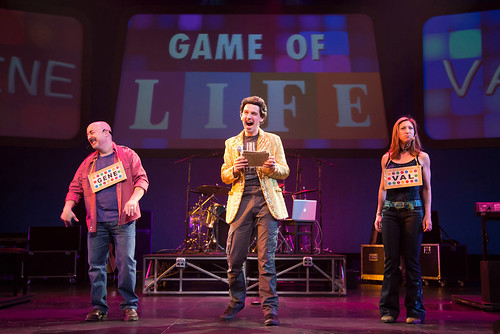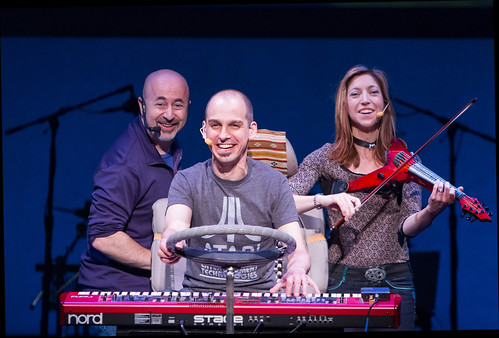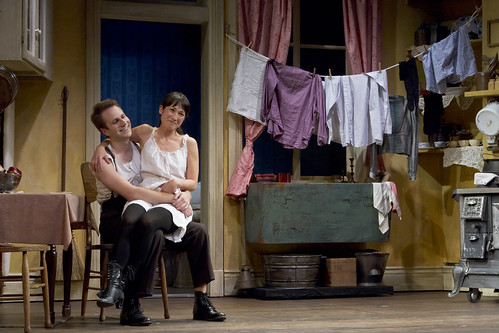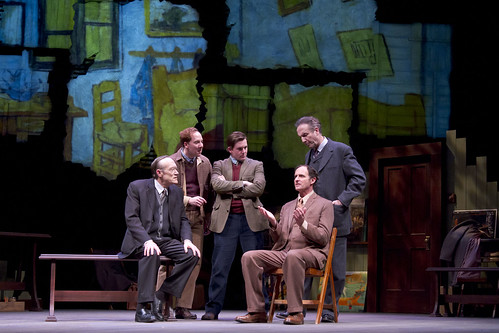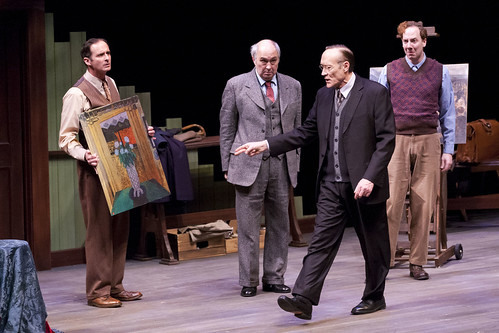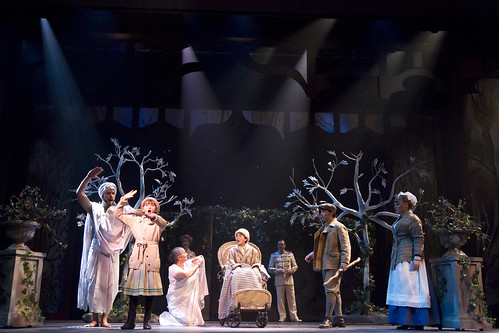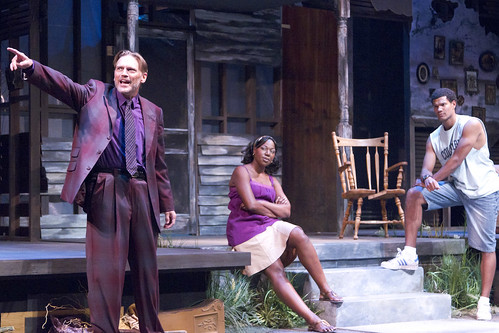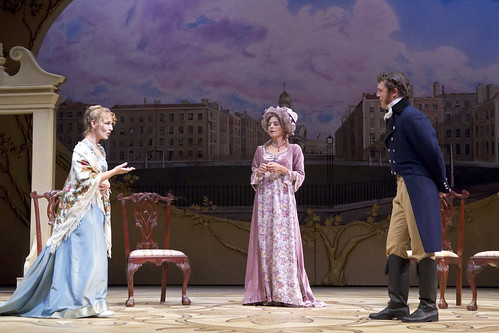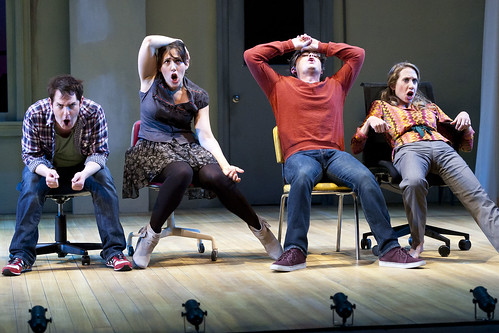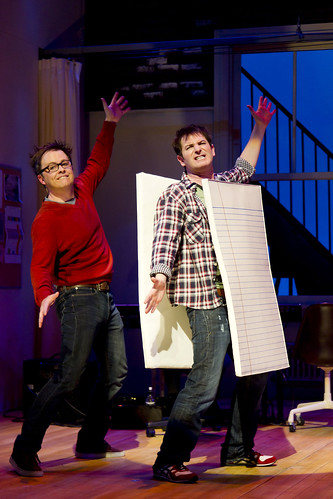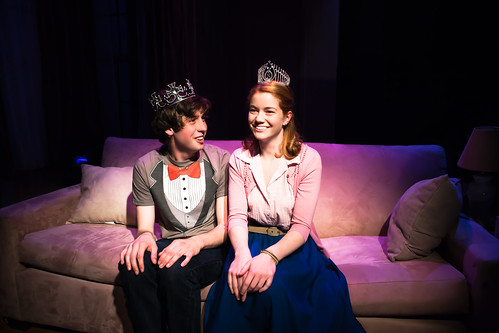
Prom nerds: Jeremy Kahn is Zack and Melissa Quine is Sherry in the hit comedy Tigers Be Still at SF Playhouse, one of two shows by Kim Rosenstock (shown just below) in the Bay Area. Below: Wade McCollum is the narrator and Kristin Stokes is Miriam in Fly By Night, Rosenstock’s musical (with Will Connolly and Michael Mitnick) at TheatreWorks. Top photo by Jessica Palopoli, photo below by Mark Kitaoka
In a recent email chat with playwright Kim Rosenstock (see full interview below), I asked her what Bay Area theatergoers might learn about her if they see both of her shows now on local stages – Tigers Be Still at the SF Playhouse and the musical Fly By Night at TheatreWorks. Her response: “It’s probably better that I don’t know the answer to this question.”
So I will take it upon myself to answer the question for her.
First the easy answer: Rosenstock is smart and funny, and she’s a talented, quirky writer. Based on the two shows available – her first in the Bay Area – she is interested in the lives of women in crisis and making choices to climb out of that crisis.

In the first few scenes of Tigers Be Still, I thought maybe Rosenstock was following in the footsteps of Sarah Ruhl (indeed, fine footsteps in which to follow). Both are putting a unique spin on old formulas but with an emphasis on women. But their voices are distinctly different. Rosenstock is ultimately more compassionate and grounded, while Ruhl is more lyrical and morose. How exciting it is to have two such intelligent and entertaining women writing about life in modern America.
It’s easy to see why Tigers has become such a hit for SF Playhouse (now extended through Sept. 10). Director Amy Glazer has found the right tone to balance the comedy and the heart in Rosenstock’s tale of a plucky young woman, Sherry (Melissa Quine), who was, like her mother and her sister, depressed and despondent and inert. Armed with her master’s in art therapy, she couldn’t get a job, so she moved in with her mother and sank into a pit of sadness. Her mother, traumatized by the exit of her father some months before as well as by illness, has barricaded herself in her bedroom and won’t come out. We don’t see her over the course of the 90-minute play, but she does call every so often.
Sherry’s sister, Grace (Rebecca Schweitzer), is a victim of infidelity – she caught her fiancé fooling around – and is now engaged to Jack Daniels and seems permanently embedded in the living room couch, which, incidentally, we’re told smells like tears. Grace is bitter about everything, especially her sister’s ability to move on: “Just because you’re suddenly all functional doesn’t mean you won’t hit rock bottom again,” she chides.
Unable to maintain her depression, Sherry is on the rebound. She has a job as a substitute art teacher (thanks to her mother pulling a few strings) and her first art therapy patient. It took someone else’s grief to pull Sherry out of her own. The patient is Zack (Jeremy Kahn), the teenage son of Joseph (Remi Sandri) Sherry’s new boss (and an old flame of her mother’s), and both men are grieving the loss of Zack’s mother in a car accident.
Doesn’t exactly sound like fodder for hilarity, but Rosenstock mines what could be a sitcom retread for laughs that come solidly from dimensional characters and realistic situations. This production really crackles whenever Quine and Kahn are together. They’re both desperate in different ways. She desperately wants to succeed and to avoid rock bottom again. He desperately wants to feel something again because his mother’s death put him into a sort of numbed zombie state.
Kahn is so utterly believable as a slack-jawed teen that everything he does is funny and poignant. His Zack is sharp enough to register Sherry’s desperation, which prompts him to observe: “I’m pretty sure the last thing anyone wants is a needy therapist.”
Rosenstock’s version of a happy ending isn’t sappy, which is a triumph in and of itself. There are no guarantees of anything – not happiness, not relief from grief, not threat of failure. But we leave the theater certain that life will continue to be interesting and intermittently functional, for all involved.
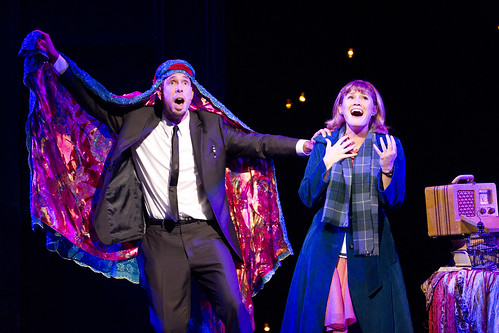
We won’t go into the ending of Fly By Night, the musical Rosenstock created with Will Connolly and Michael Mitnick. You wouldn’t call it happy, but neither is the musically, which you might describe as cheerfully grim.
Of the recent world-premiere musicals, including ACT’s Tales of the City and Cal Shakes’ The Verona Project, Fly By Night boasts by far the most interesting score. Set in the mid-’60s, the show has actual songs with beginnings, middles and endings, and those songs reveal character AND further plot AND they have tuneful, occasionally memorable melodies. What a concept. There are echoes of the ’50s in some of the tunes, some of the guitar-based folk of the era as well as hints of the British invasion.
Aside from the score, the biggest plus in Fly By Night is Wade McCollum as the narrator, who steps into a number of roles, most memorably as a South Dakota mother pushing her daughters to move to New York and a groovy club owner. McCollum is onstage for the duration of this nearly three-hour show, and he’s mesmerizing and funny. He sings the title song and dons a flowing headdress to play a gypsy with an important prophecy. He gets unexpected laughs and makes a solid connection with the audience that benefits this overstuffed musical immensely.
Rosenstock, Connolly and Mitnick have set up an old-fashioned love triangle. Sandwich maker Harold (Ian Leonard) falls in love with Daphne (Rachel Spencer Hewitt), who has just moved to New York from South Dakota with her waitress sister Miriam (Kristin Stokes). Daphne swears she’s born to be a Broadway star, but somehow she falls for the charms of the guitar-playing Harold (who’s grieving the loss of his mother, not unlike like Zack in Tigers). Playing it almost too cute, Harold never meets Miriam until the very day when the gypsy tells the waitress that she’s about to meet her soul mate. Somehow when they meet, Miriam and Harold don’t know they’re connected by Daphne, but too much knowledge always did spoil a good triangle.
Though the authors are exploring the monotony of daily life, the sacrifices required to fulfill dreams and the mysteries of fate, three hours seems an awfully long time to spend on what is really a slight romantic tale. They try to fill in the periphery with quirky, interesting supporting characters. Crabble (Michael McCormick) is Harold’s sandwich-making boss and victim of monotony (repeatedly sung in a catchy refrain of “mayonnaise, meat, cheese and lettuce). Keith Pinto is Joe Storms, an aspiring Broadway playwright and part of a Broadway family famous for taking Broadway by…
The most intriguing character in the show is Harold’s father, played by James Judy, whose grief is so profound he carries a record player around as if it were his recently deceased wife. He keeps trying to tell the story about why La Traviata means so much to him, but no one really has time to listen – until his big number, “Cecily Smith,” a powerfully emotional song that stopped the show on opening night.
Though the show feels too long, it doesn’t drag exactly, and we can likely credit director Bill Fennelly and the appealing cast for that. It just feels like too much for this particular story. We get reveries about the stars (beautifully and frequently illuminated in Dane Laffrey’s set design), lurches backward and forward in time, metaphysical interference and a famous Eastern seaboard blackout.
Michael Pettry’s quartet is visible through a window at the back of the black-painted stage, and it’s nice that we’re able to see the hardworking musicians creating such a full, infections sound for the score.
In the end, Fly By Night has an appealing message: it’s not what you do in life but who you do it with. And there’s death and sadness and grief and frustration and depression and mistakes all over the place. This is hardly a fairy tale, though it often feels like one. I thought if Seesaw, the 1973 musical by Cy Coleman, Dorothy Fields and Michael Bennett and based on the William Gibson play Two for the Seesaw was mated with the 2006 rock musical Spring Awakening, the result might look and sound a whole lot like Fly By Night. Not a bad combo.
So here we have the bravura, double-feature Bay Area debut of Kim Rosenstock, a playwright who, even amid this abundance, leaves us wanting more.
[bonus interview]
I had the pleasure of interviewing Kim Rosenstock for the San Francisco Chronicle. Read the story here.
FOR MORE INFORMATION
Kim Rosenstock’s Tigers Be Still continues an extended run through Sept. 10 at the SF Playhouse, 533 Sutter St., San Francisco. Tickets are $30-$50. Call 415-677-9596 or visit www.sfplayhouse.org for information.
Fly By Night by Kim Rosenstock, Will Connolly and Michael Mitnick continues through Aug. 13 in a TheatreWorks production at the Lucie Stern Theatre, 1305 Middlefield Road, Palo Alto. Tickets are $19-$69. Call 650-463-1960 or visit www.theatreowrks.org for information.



